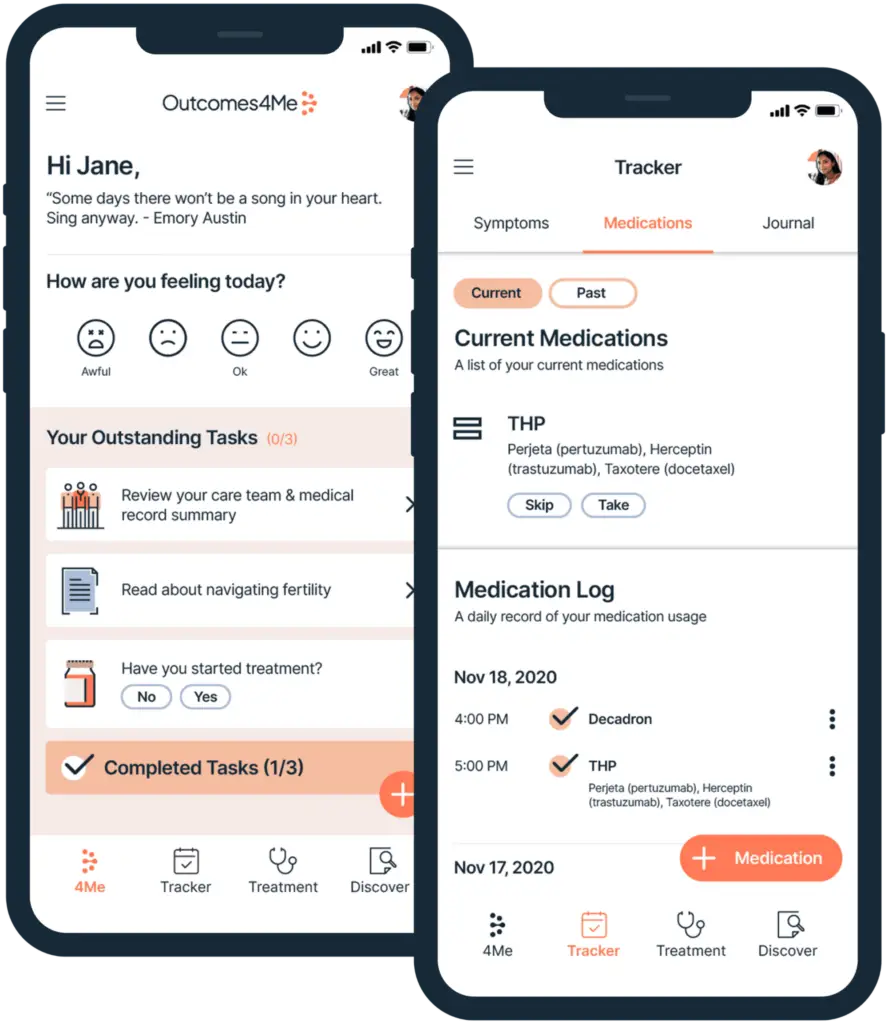
Last week breast oncologists and researchers from across the globe presented at the annual European Society of Medical Oncolgy’s Breast Cancer Virtual Congress (ESMO). This breast cancer-focused conference features the latest advances in treatments and care management. We’ve summarized a few of the major findings presented at the conference for you.
Clinical trial data of two novel therapies show promising results for metastatic disease
Veru presented data from their phase 2 clinical trial of Enobosarm, a novel oral therapy drug targeting the androgen receptor. Enobosarm was studied in AR+/ER+/HER2- metastatic breast cancer patients who had progressed on an estrogen blocking agent, chemotherapy and a CDK4/6 inhibitor. Patients taking Enobosarrm had a mean progression free survival of 10 months and 60% of patients experienced either tumor shrinkage or stable disease at 24 weeks.1 Enobosarrm had a manageable safety profile and will be further studied in the phase 3 ARTEST trial beginning in June 2021.
Datopotamab Deruxtecan, a TROP2-directed antibody drug conjugate, is currently being studied in advanced metastatic breast cancer patients. The phase 1 clinical trial data presented at ESMO focused on safety and efficacy in triple negative breast cancer (TNBC). In the 21 heavily pretreated advanced TNBC patients, Datopotamab Deruxtecan has a 43% objective response rate or a reduction in disease burden.2 Additionally, Datopotamab Deruxtecan had a manageable safety profile with the most common symptoms being grade 1 or 2 mouth sores and nausea.2 As this is a small, early stage study, further trials are required to confirm these results. Datopotamab Derextecan will also be studied in metastatic hormone positive cancer.
While Enobosarm and Datopotamab Deruxtecan need to be studied in further clinical trials, they show promising results in heavily pretreated metastatic patients.
Shorter duration of adjuvant trastuzumab shows similar long term clinical benefit to standard practice
During the conference, researchers presented the long term results of the phase 3 SHORT-HER trial where HER2+ patients who were at low or intermediate risk of recurrence received either 9 weeks of adjuvant trastuzumab or 1 year of adjuvant trastuzumab. Low or intermediate risk is determined by tumor size and nodal status and represents a large portion of early stage HER2+ cancer. Patients who received 1 year of trastuzumab had nearly the same 5 year disease free survival as patients who received 9 weeks of trastuzumab, 88% compared to 86% respectively.3 Researcher Dr. Pier Franco Conte, a professor of oncology at the University of Padova, Italy; director of the Division of Medical Oncology at the Istituto Oncologico Veneto in Padova; and chairman of Rete Oncologica Veneta says, “Although 1 year of trastuzumab remains a standard, de-escalation of treatment is a reasonable option for a large proportion of a real-world population of [patients with] HER2-positive early breast cancer.”4
Varying symptom burdens after treatment call for personalized survivorship care
Researchers from the Netherlands Cancer Institute presented data on the widely varying symptom burdens across breast cancer survivors. Researcher Kelly de Ligt, a postdoctoral fellow, explains that, “Previous studies had assessed side-effects experienced after the end of treatment as independent items, but in reality, survivors usually experience multiple symptoms that can add up and weigh heavily on their daily life. We wanted to measure the overall burden on their health-related quality of life and see if any patterns emerged that would better inform us on which individuals require active symptom management.”5 Researchers interviewed 404 breast cancer survivors about their current symptoms and divided the cohort into three groups: low, intermediate and high symptom burdens. They also surveyed 1,300 women from the general Dutch population for comparison. Participants in the low and intermediate symptom burden group had a similar symptom profile to the general population. However, patients in the high symptom burden group (15% of participants) had scores that were 15-20% worse than the general population across all symptoms.6
This study confirms the needs for personalized follow up care plans. Identifying patients with a high symptom burden group can help physicians better manage their symptoms as they may need longer or more consistent follow up than patients with a low or intermediate symptom burden.
References
- Palmieri C, Linden H, Birrell S, et al. Efficacy of Enobosarm, a selective androgen receptor (AR) targeting agent, in patients with metastatic AR+/ER+ breast cancer resistant to estrogen receptor targeted agents and CDK 4/6 inhibitor in a Phase 2 clinical study. Presented at: ESMO Breast Cancer Virtual Congress 2021; May 5-8, 2021; Virtual. Abstract 100P.
- Bardia A, Juric D, Shimizu T, et al. Datopotamab deruxtecan (Dato-DXd), a TROP2-directed antibody-drug conjugate (ADC), for triple-negative breast cancer (TNBC): Preliminary results from an ongoing phase 1 trial. Presented at: ESMO Breast Cancer Virtual Congress 2021; May 5-8, 2021; Virtual. Abstract LBA4.
- Conte P, Frassoldati A, Bisagni G, et al. Nine weeks vs 1 year adjuvant trastuzumab: long term outcomes of the Short-HER randomized trial. Presented at: ESMO Breast Cancer Virtual Congress 2021. May 5-8, 2021; Virtual. Abstract 401.
- Virgil, Hayley. “Shorter Duration of Adjuvant Trastuzumab Shows Long-Term Survival Benefit in Select HER2+ Early Breast Cancer.” OncLive, 7 May 2021, www.onclive.com/view/1-year-and-9-week-adjuvant-trastuzumab-show-superimposable-long-term-survival-in-her2-early-breast-cancer.
- Myesmo. “Personalised Follow-up Care Needed to Address Varying Health Burdens in Breast Cancer Pts.” EurekAlert!, 3 May 2021, eurekalert.org/pub_releases/2021-05/esfm-pfc043021.php.
- de Ligt K, de Rooij B, Walraven I, et al. Towards tailored follow-up care for breast cancer survivors: cluster analyses based on symptom burden. Presented at: ESMO Breast Cancer Virtual Congress 2021; May 5-8, 2021; Virtual. Abstract 134P_PR.




